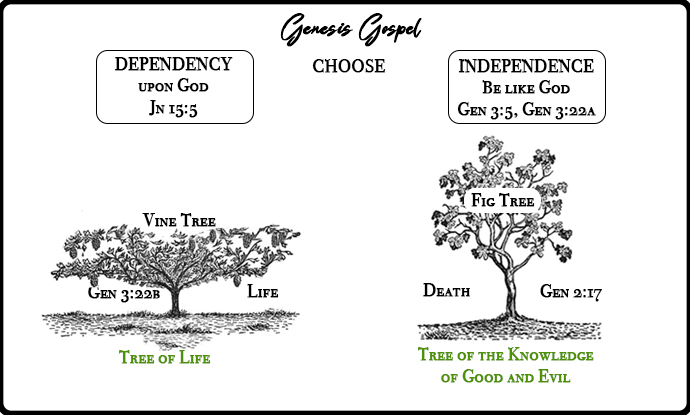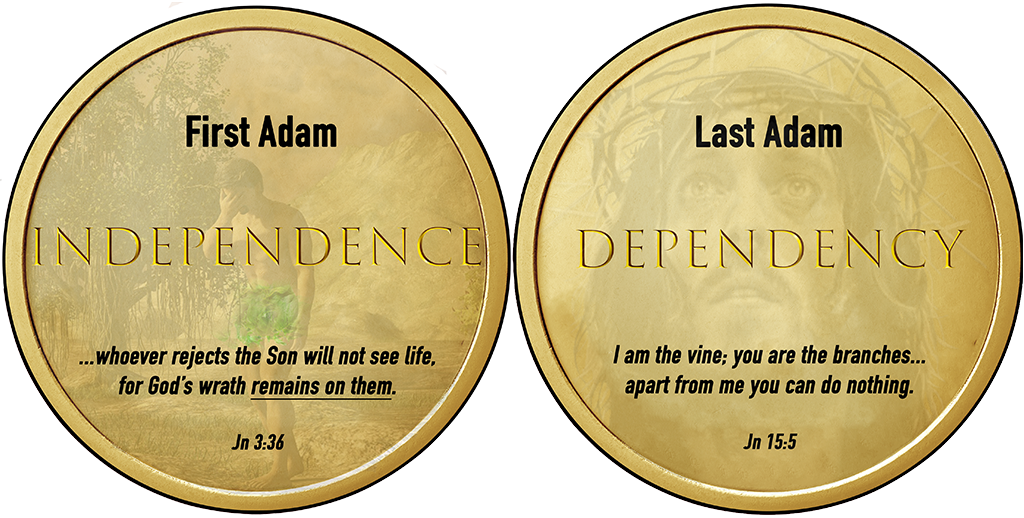Adam had a single-step Gospel. His decision was to choose between life and death, to be dependent upon God, or to be independent—his own god, who would choose for himself, what was good and what was evil. After he made the sinful choice, God couldn’t allow Adam to eat from the “tree of life” or he would have gained eternal life Gen 3:22, yet be separated from God forever (spiritual death Rev 20:14,15), because of his unpaid sin Gen 2:17; Ro 6:23. The wages of sin is both physical and spiritual death. Adam’s physical body would turn back to dust because of his sin Gen 3:19. This was a slow process but eventually happened Gen 5:5. However, his spiritual death was immediate. After eating the forbidden fruit, Adam’s conscience Pr 20:27 was activated. Previously, his nakedness produced no shame Gen 2:25, but after his disobedience, he felt shame through his conscience’s conviction of unrighteousness and tried to cover his unworthiness Gen 3:7. His guilt drove him into hiding when he heard God approaching Gen 3:8. This separation was the result of sin. A holy God 1 Pe 1:16 demands holiness and lack of it produces spiritual isolation Isa 59:2.
God confronted Adam concerning his sin Gen 3:11. Adam admitted that he had eaten from the tree, yet, he rationalized the incident, and placed the blame on Eve and God Gen 3:12. Adam’s punishment was toilsome labour through the cursed ground and eventual physical death Gen 3:17,18,19.
Sin had separated man Eph 4:18, in his mind Col 1:21 (spiritual death Eph 2:1,2,3), but God desired to provide a bridge for man to return to fellowship. Jesus was the bridge to life Jn 1:51.
In His grace, God had promised through Eve’s offspring, the Messiah would defeat the enemy (Satan) Gen 3:15. Adam believed God and named his wife Eve, for she would become the mother of all the living Gen 3:20. Through Jesus’ sacrifice, eternal life would be available to all, who would receive Him Jn 1:12. Adam had chosen independence, but God had offered him sonship into the family of God, by turning to God in dependency.
To provide fellowship Heb 9:22, God covered Adam’s sin by killing an animal Gen 3:21. After Jesus paid for man’s sin, God could send the Holy Spirit to indwell believers because sin was no longer only covered, but taken away Col 2:13.
Salvation is a decision between life and death, dependency on God or independency in oneself. The words believe Jn 3:16, faith Eph 2:8,9, trust Pr 3:5 are synonymous terms which describe dependency upon God.
After Christ’s sacrifice, God offered mankind the two-step Gospel. Step one involved the payment of man’s sin which was accomplished through the crucifixion of Jesus. To qualify for this forgiveness, man must acknowledge that he is a sinner deserving death (repent means to change your mind), and accept Jesus’ sacrifice on his behalf.
Step two became possible after Jesus was resurrected from the dead. His resurrection proclaimed the Good News that Jesus was the Tree of Life Jn 14:6, who was transplanted in Calvary Jn 11:25, died, buried and on the third day rose from the dead 1 Co 15:3,4. Now man has a choice, not between two trees, but between two men. He can choose to remain in the first Adam and live independently, or he can put his trust in the last Adam and receive eternal life 1 Co 15:45.
A quick summary:
To repent means to change your mind or purpose; spiritually, to turn away from sin and change your actions to obey God’s will (like a 180º change in direction).
To turn to God means giving up your independent lifestyle, with you on the throne, and turning to God in dependency, to be controlled by Him Ro 8:9 NLT.


